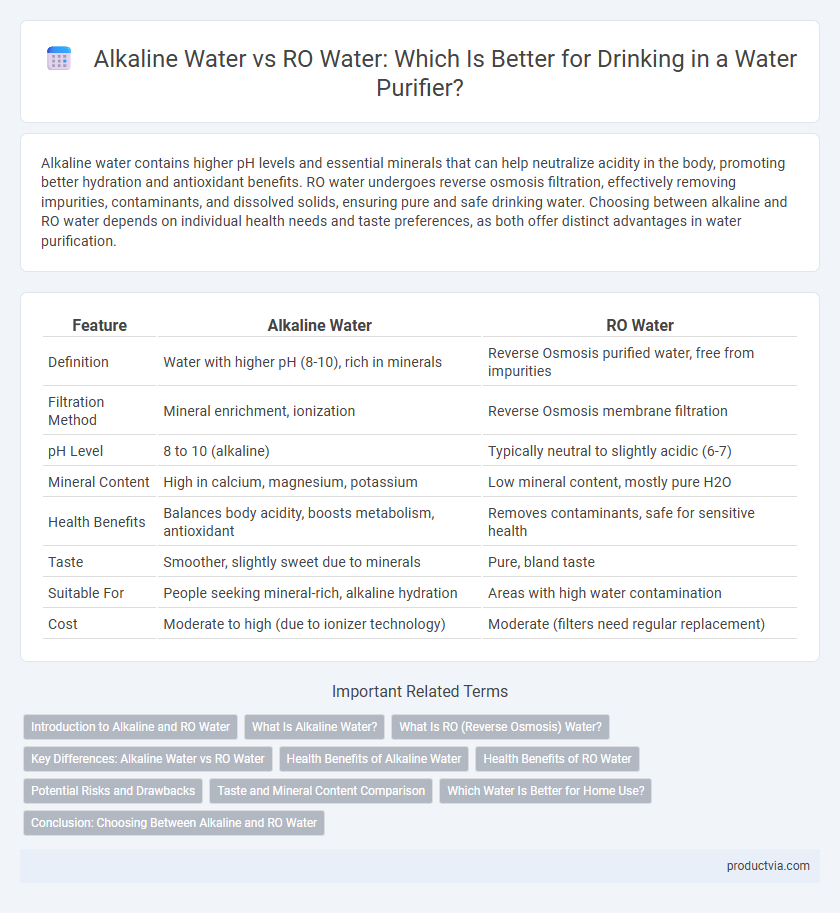Alkaline water contains higher pH levels and essential minerals that can help neutralize acidity in the body, promoting better hydration and antioxidant benefits. RO water undergoes reverse osmosis filtration, effectively removing impurities, contaminants, and dissolved solids, ensuring pure and safe drinking water. Choosing between alkaline and RO water depends on individual health needs and taste preferences, as both offer distinct advantages in water purification.
Table of Comparison
| Feature | Alkaline Water | RO Water |
|---|---|---|
| Definition | Water with higher pH (8-10), rich in minerals | Reverse Osmosis purified water, free from impurities |
| Filtration Method | Mineral enrichment, ionization | Reverse Osmosis membrane filtration |
| pH Level | 8 to 10 (alkaline) | Typically neutral to slightly acidic (6-7) |
| Mineral Content | High in calcium, magnesium, potassium | Low mineral content, mostly pure H2O |
| Health Benefits | Balances body acidity, boosts metabolism, antioxidant | Removes contaminants, safe for sensitive health |
| Taste | Smoother, slightly sweet due to minerals | Pure, bland taste |
| Suitable For | People seeking mineral-rich, alkaline hydration | Areas with high water contamination |
| Cost | Moderate to high (due to ionizer technology) | Moderate (filters need regular replacement) |
Introduction to Alkaline and RO Water
Alkaline water is characterized by a higher pH level, typically above 7, which neutralizes acidity in the body and contains essential minerals like calcium, magnesium, and potassium. Reverse Osmosis (RO) water is purified through a semi-permeable membrane that removes contaminants, heavy metals, and dissolved solids, producing highly purified and clean drinking water. Both types serve distinct purposes: alkaline water aims to balance pH and enhance hydration, while RO water prioritizes removing impurities for safety and taste.
What Is Alkaline Water?
Alkaline water is water that has a higher pH level than regular drinking water, typically above 7, making it less acidic. It contains alkaline minerals such as calcium, magnesium, and potassium, which can help neutralize acid in the bloodstream and improve hydration. Unlike RO water that undergoes reverse osmosis filtration to remove impurities, alkaline water emphasizes mineral content and pH balance for potential health benefits.
What Is RO (Reverse Osmosis) Water?
RO (Reverse Osmosis) water is purified by forcing tap water through a semi-permeable membrane that removes contaminants such as heavy metals, chemicals, and dissolved salts, ensuring high water purity. This filtration process eliminates impurities at a molecular level, making RO water safe and suitable for drinking by significantly reducing total dissolved solids (TDS). RO systems are highly effective for households seeking clean, contaminant-free water with improved taste and safety.
Key Differences: Alkaline Water vs RO Water
Alkaline water contains a higher pH level, usually between 8 and 9.5, enriched with minerals like calcium and magnesium, which can help neutralize acidity and improve hydration. RO water is purified through reverse osmosis, removing contaminants and dissolved solids for pure, mineral-free water, often requiring remineralization for taste and health benefits.
Health Benefits of Alkaline Water
Alkaline water contains a higher pH level, typically between 8 and 9, which helps neutralize acid in the bloodstream and may improve metabolic functions. It is rich in essential minerals like calcium, potassium, and magnesium, supporting bone health and hydration. Unlike RO water, which removes most minerals, alkaline water provides antioxidant properties that may reduce oxidative stress and enhance overall well-being.
Health Benefits of RO Water
RO water removes up to 99% of contaminants, including heavy metals, bacteria, and viruses, ensuring highly purified drinking water that supports overall health. This purification process reduces the risk of waterborne diseases and exposure to harmful substances, promoting better digestive health and immune function. Regular consumption of RO water helps maintain hydration with safe, clean water free from pollutants commonly found in tap or untreated sources.
Potential Risks and Drawbacks
Alkaline water may pose risks such as disrupting the body's natural pH balance and causing gastrointestinal issues if consumed excessively. RO water, while effective at removing contaminants, can also strip essential minerals like calcium and magnesium, potentially leading to mineral deficiencies over time. Both purification methods require careful consideration of individual health needs and water quality to avoid adverse effects.
Taste and Mineral Content Comparison
Alkaline water offers a smoother taste due to its higher pH level and retained essential minerals like calcium and magnesium, which contribute to enhanced flavor and potential health benefits. RO water undergoes reverse osmosis filtration, removing most minerals and impurities, resulting in a neutral taste that some may find flat or less flavorful. Choosing between alkaline and RO water depends on taste preference and the importance of mineral content for individual health needs.
Which Water Is Better for Home Use?
Alkaline water, rich in minerals like calcium and magnesium, helps neutralize acidity and supports hydration, making it beneficial for daily home consumption. RO (Reverse Osmosis) water undergoes thorough filtration to remove contaminants, heavy metals, and impurities, ensuring pure and safe drinking water especially in areas with poor water quality. For home use, RO water is generally preferred for its comprehensive purification, while alkaline water offers added health benefits for those seeking mineral-enriched hydration.
Conclusion: Choosing Between Alkaline and RO Water
Choosing between alkaline water and RO water for drinking depends on individual health needs and water quality. Alkaline water offers antioxidant benefits and helps balance body pH, while RO water provides thorough purification by removing contaminants and impurities. Assessing local water sources and personal health goals ensures an informed decision between the two purification options.
Alkaline Water vs RO Water for Drinking Infographic

 productvia.com
productvia.com